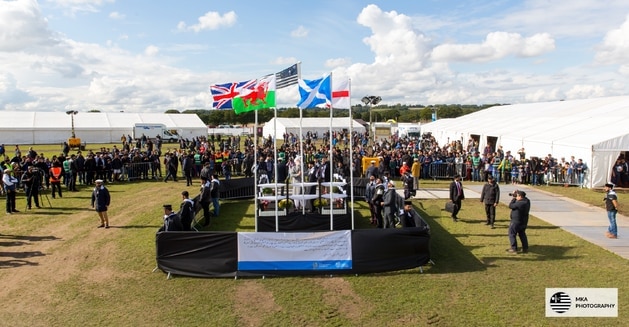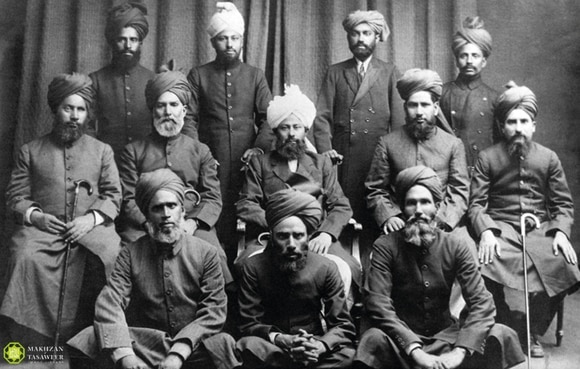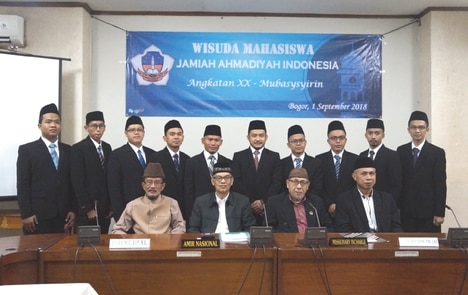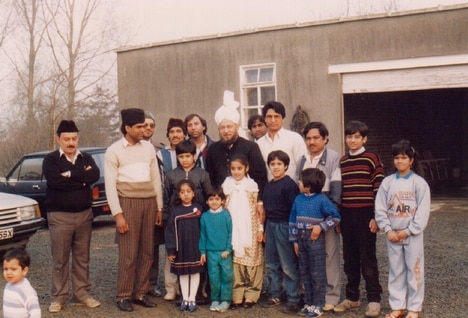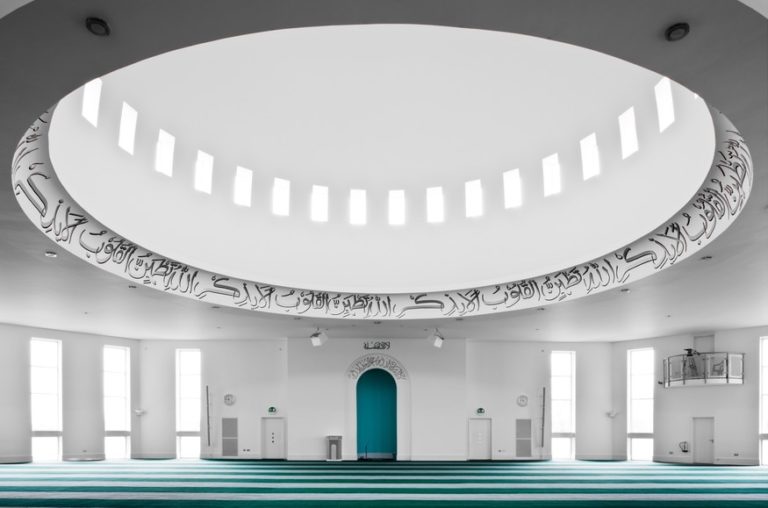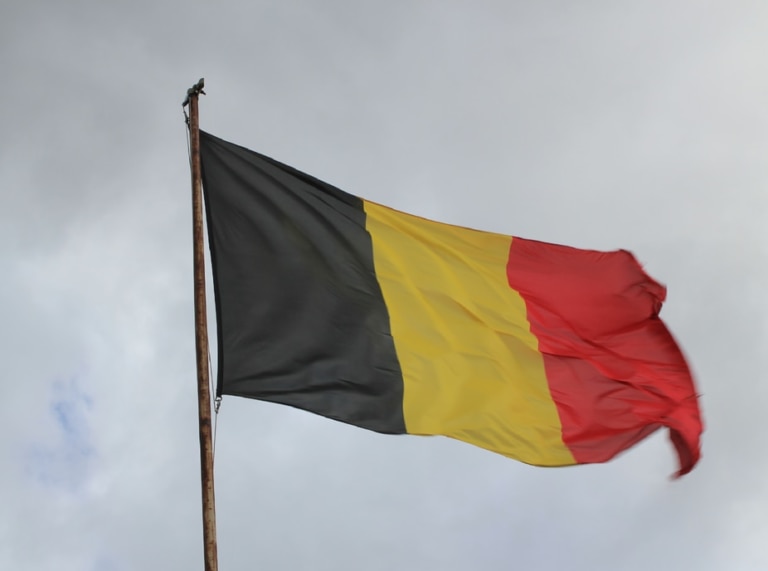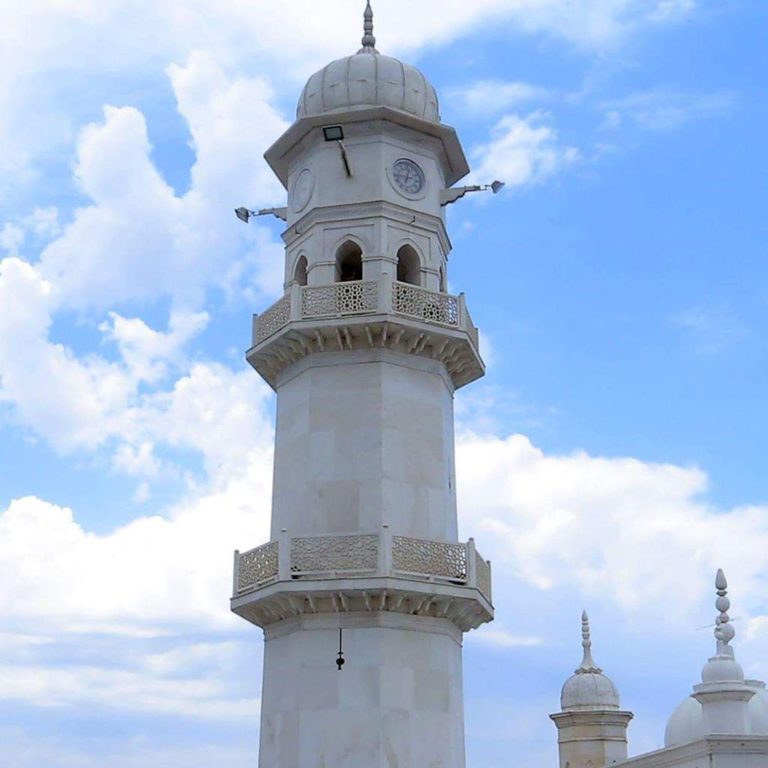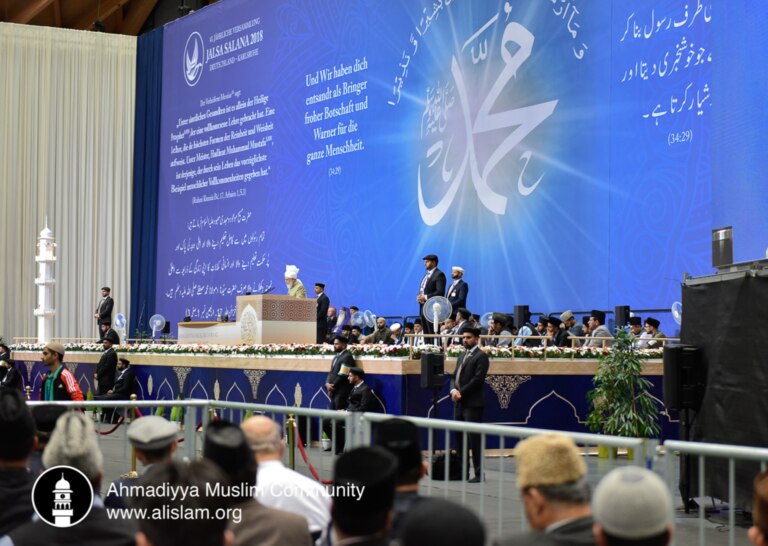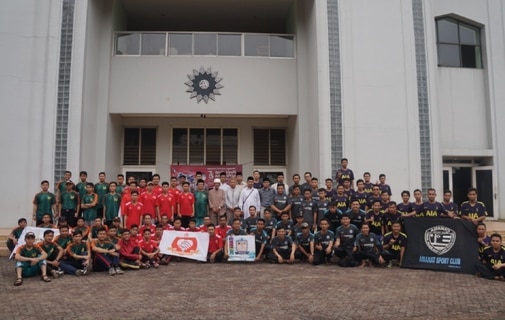Friday Sermon
17 August 2018
Men of Excellence
After reciting the Tashahud, Ta‘awuz, and Surah Al-Fatihah, Hazrat Khalifatul Masih Vaa stated:
Today, I shall again speak on some of those Companionsra, who participated in the Battle of Badr. The first one among them is Hazrat Amirra bin Rabi‘ah. His family was a confederate of Khattab, the father of Hazrat Umarra, who had adopted Hazrat Amirra. That is the reason why he used to be known as Amir bin Khattab. However, when the Holy Quran commanded all to refer to their actual forefathers, he was, from then on, referred to as Amir Bin Rabi‘ah instead of Amir bin Khattab, i.e. by the name of his actual father Rabi‘ah, as per the patrilineal relationship.
Here, a clarification has been provided to those people who have adopted the children of their relatives and loved ones and those children do not even know who their actual fathers are until they grow older. The identity cards and official documents also bear the names of the adoptive fathers instead of the actual fathers. When later this practice leads to certain difficulties, people write letters requesting that such and such changes should be made. Therefore, one should always act in accordance with the Quranic injunctions, except in the case of such children, who are received or adopted and taken by certain authorities and one is not told about their parent’s information. After this clarification, I will now proceed further to speak on [the companion].
It was said that he had a confederate and due to this relationship, there were friendly terms between Hazrat Umarra and Hazrat Amirra till the end. He accepted Islam right at the outset. The Holy Prophetsa had not yet sought refuge at Dar-e-Arqam when he believed. (Sirat-ul-Sahaba, Vol. 2, p. 333, Dar-ul-Isha‘at, Karachi)
Hazrat Amirra migrated to Abyssinia along with his wife Laila bint Hathmah. Later, he returned to Mecca, and from there, he migrated to Medina along with his wife. The wife of Hazrat Amirra bin Rabi‘ah has the honour of being the first woman to have emigrated to Medina. He participated in Badr and all other battles along with the Holy Prophetsa. He passed away in the 32nd year of Hijra. He came from the Ans tribe.
Hazrat Amirra bin Rabi‘ah narrated that the Holy Prophetsa said to him, “When one of you witnesses a funeral procession and does not join it, he should keep standing until the procession has passed or the [coffin] is laid down.”
Abdullah bin Amirra narrates from his father, Hazrat Amirra, that he once stood up to perform his prayer. It was the time when people were arguing regarding Hazrat Usmanra. That particular fitna [revolt] had started and people used to revile Hazrat Usmanra. He further states that he fell asleep after the prayer and he saw in a dream that he was being ordered to get up and pray that he may be saved from that evil from which God Almighty had saved His pious people from. Thus, Hazrat Amirra bin Rabi‘ah got up and offered Salat and then supplicated in this regard. After this, he fell ill and never left his home after that until his funeral procession left his home. (Usdul Ghaba, Vol. 3, pp. 118-119, Amir Bin Rabi‘ah, Dar-ul-Kutb Ilmiyah, Beirut)
This is how God Almighty saved him from that evil.
Hazrat Amirra bin Amr narrated that, “I was with the Holy Prophetsa during a Tawaf [performing circuit of the Ka‘bah] while a shoelace of the Holy Prophet’ssa shoe broke. I said, ‘O Messenger of Allah! Give it to me so that I may repair it!’ The Holy Prophetsa replied, ‘This is termed as preferential treatment and I do not like to be given preferential treatment.’” (Sharah Zarqani, Vol. 6, p. 49, Dar-ul-Kutub Al-ilmiyyah, 1996, Beirut)
This is the extent to which the Holy Prophetsa was particularly mindful regarding doing his work himself.
A person once came to Hazrat Amir bin Rabi‘ah as a guest. He was very hospitable and respectful towards him and even put in a favourable recommendation for him to the Holy Prophetsa. Thus, after having gone to the Holy Prophetsa, this person went to Hazrat Amirra and said, “I requested the Holy Prophetsa to grant me a valley as a freehold, which would have no equivalent throughout the whole of Arabia. Hence, the Holy Prophetsa granted me this. I now desire to give a piece of that valley to you, which will belong to you during your lifetime and to your children after you have passed away. Hazrat Amirra replied, “I am in no need of this piece of land from you as today, a Surah [chapter of the Holy Quran] has been revealed, which has entirely made us forget the world and that is:
اِقْتَرَبَ لِلنَّاسِ حِسَابُهُمْ وَهُمْ فِيْ غَفْلَةٍ مُعْرِضُوْنَ
(Hiyat-ul-Sahaba, Muhammad Yousaf, Vol. 2, Baab Infaaq fi Sabeelillah, Mu’assisat-ul-Risala, 1999)
That is, ‘Nigh has drawn for men their reckoning, yet they turn away in heedlessness.’” (Surah Al-Anbiya, Ch.21: V.2)
Such was the state of fear of God Almighty of these shining stars and these were the very people, who truly gave precedence to faith over the world. Hazrat Amir bin Rabi‘ah relates that Zaid bin Amr said, “I opposed my nation and instead, followed the religion of Abrahamas. I was awaiting for a prophet to appear from the progeny of Ishmaelas whose name would be Ahmad. However, it seems that I will not be able to witness him. I believe in him, testify to his truth and affirm that he is a prophet. If you will be alive during the era of his advent, then convey my salam [greetings of peace] to him. I will mention such signs of his to you as a result of which he will not remain hidden from you. He is neither tall nor short. He will neither have a lot of hair, nor little. There will always remain a redness in his eyes. Between his shoulders, you will find the seal of prophethood. His name will be Ahmad. This city of Mecca will be the place of his birth as well as the place where he will take the pledge of initiation. Following this, his nation will drive him out of here. They will dislike his message. He will then migrate to Yathrib [Medina]. Following this, those who oppose will gain ascendency but do not by deceived by them. I have looked through every city in search of the religion of Abrahamas. I enquired from the Jews, Christians and Zoroastrians and they told me that this religion will come after you have passed. They told me the same signs I have mentioned to you. They said that no prophet will come after him.” Hazrat Amir said, “When the Holy Prophetsa was appointed [as a Prophet], I informed him of Zaid upon which he said, ‘I saw him in paradise while he was pulling along his garment.’” (Subul-ul-Huda Wa Al-Rushd, Vo. 1, p. 116, Dar-ul-Kutub Al-Ilmiyyah, Beirut, 1993)
In this narration, where it states that no prophet shall come after him does not mean that the prophecy of the Holy Prophetsa regarding a prophet from within his people to appear is incorrect. It means that he is the last law-bearing prophet and any prophet who appears after him will not bring any new law. The [prophet] to appear will be subordinate to the Holy Prophetsa. This is exactly what we find in the Ahadith [sayings of the Holy Prophetsa] and the Holy Quran.
The Holy Prophetsa formed a bond of brotherhood between Hazrat Amir and Hazrat Yazidra bin Munzir. (Al-Tabkaat-ul-Qubra, Vol. 3, p. 296, Dar-ul-Kutub Al-Ilmiyyah, Beirut, 1990)
Hazrat Amir bin Rabi‘ah passed away a few days following the martyrdom of Hazrat Usmanra. (Usdul Ghaba, Vol. 3, p. 119, Amir Bin Rabi‘ah, Dar-ul-Kutb Ilmiyah, Beirut, 1990)
The second Companion is Hazrat Haraamra bin Milhan. Hazrat Haraamra bin Milhan belonged to the Ansari tribe of Banu Adi bin Najaar. His father’s name was Malik bin Khalid and his mother’s name was Malika bint Malik. His sister, Hazrat Umme Sulaimra, was the wife of Hazrat Abu Talha Ansarira and the mother of Hazrat Anasra bin Malik. His other sister was Hazrat Umme Haraamra and was the wife of Hazrat Abadara bin Saamit. Hazrat Haraamra bin Milhan was the maternal uncle of Hazrat Anasra and took part in the Battle of Badr and Uhad. He was martyred on the day of Bir-e-Mauna. Hazrat Anasra bin Malik relates that a few people came before the Holy Prophetsa and requested for some people to be sent to them who would teach them about the Holy Quran and the practise of the Holy Prophetsa. The Holy Prophetsa sent seventy companions with them who were proficient in the recitation of the Holy Quran. Hazrat Anasra relates that his uncle, Haraamra bin Milhan, was also among them. These group of people would recite the Holy Quran and give its lectures in the evening and learn from one another. During the day they would bring water to the mosque and collect wood from the jungle and would sell it. They would then spend their earnings on buying grain for the Ahle-Sufaa [those Companions who had devoted their time to spend in the company of the Holy Prophetsa] and for the poor. (Al-Tabkaat-ul-Qubra, Vol. 3, p. 390, Haraam bin Milhan, Dar-ul-Kutub Al-Ilmiyyah, Beirut, 1990), (Al-Asaaba Fi Tameez Al-Sahaba, Vol. 8, pp. 375-376, Umme Haraam bin Milhan & Vol. 8, pp. 408-409, Umme Saleem bint Milhaan, Dar-ul-Kutub Al-Ilmiyyah, Beirut, 1995)
A few months ago, I related the incident at Bir-e-Mauna with reference to Hazrat Haraamra bin Milhan and have mentioned this on a few other occasions as well. However, I shall present some narrations from Bukhari which have not been mentioned previously.
Hazrat Anasra bin Malik relates that on the day of Bir-e-Mauna, when Hazrat Haraamra bin Milhan was struck by an arrow, he placed some of his blood on his hand and sprinkled it on his face and head and said,
فزْتُ وَ رَبِّ الْكَعْبَةِ
“By the Lord of the Ka‘bah, I have attained my objective.” (Sahih Al-Bukhari, Kitaab-ul-Maghaazi, Baab Ghazwah-e-Raji Wa Ra’il, Hadith. 4092)
Hazrat Anasra relates that some people from the R‘il, Zakwan, Ussayyah and the Banu Lahyan tribe came to the Holy Prophetsa and said they had become Muslims and sought help for protection from their own people. The Holy Prophetsa helped them with seventy Ansar Companions of his. Hazrat Anasra further relates that they referred to them as “qaris” for they would collect wood in the day and would spend the nights in prayer. They took these people and when they reached Bir-e-Mauna, they betrayed them and killed them. For one whole month, and according to other narrations for forty days, the Holy Prophetsa stood in his Salat and prayed against the people of R‘il, Zakwan and Banu Lahyan. (Sahih Al-Bukhari, Kitaab-ul-Jihad Wa Al-Sair, Hadith. 2801)
Hazrat Anasra relates that when these Qaris were martyred, the Holy Prophetsa stood in his prayers with great humility and for one whole month prayed against them. In another narration of Bukhari, it states that he never witnessed the Holy Prophetsa in such grief and sorrow as he did on that occasion. (Sahih Al-Bukhari, Kitaab-ul-Janaiz, Hadith. 1300)
Another narration which has also been related from Hazrat Anasra that the Holy Prophetsa for one whole month would stand in prayer after the Ruku‘ and pray against some of the tribes of Banu Sulaim. He further states that the Holy Prophetsa sent forty or seventy of his companions from among the qaris to the idolaters and they betrayed them and killed them even though they had a treaty with the Holy Prophetsa. Then he stated the same statement as mentioned earlier that he had never witnessed the Holy Prophetsa express such grief and sorrow as he had done at the death of these qaris. (Sahih Al-Bukhari, Kitaab-ul-Jizya, Hadith. 3170)
Then there is a reference from the sirat [biography] of Ibn-e-Hisham regarding Jabbar bin Salma Amr bin Tufail who was present at the time and later converted to Islam. He states: “I accepted Islam because [of the following incident]. Once I stabbed someone between the shoulders with a spear. I saw that the sharp end of the arrow had pierced through his chest but I heard that person say
فُزْتُ وَرَبِّ الْكَعْبَة
‘I swear by the Lord of Ka’bah, I have attained my objective.’ I thought what type of success is this? Have I not martyred him?” Jabbar states: “Later on I enquired about the meaning of this man’s words and came to know that it implied attaining martyrdom and I said to myself, indeed that person attained success in the sight of God.” (Al-Sira Al-Nabawiyya Li ibn-e-Hisham, p. 603, Dar-ul-Kutub Al-Ilmiyyah, Lebanon, 2001)
We find that two or three other companions who used similar words. These people believed that obtaining the pleasure of God Almighty was their main objective. Attaining worldly accomplishments was never their true ambition. It was because of this intention that God Almighty declared that He was pleased with them.
At the time of Bir-e-Mauna when the companions were getting martyred, they prayed to God Almighty:
اَللّٰهُمَّ بَلِّغْ عَنَّا نَبِيَّنَا اَنَّا قَدْ لَقِيْنَاكَ فَرَضِيْنَا عَنْكَ وَرَضِيْتَ عَنَّا
“O Allah! Please inform the Prophetsa about our condition that we have joined you and we are pleased with You and You are pleased with us.” Hazrat Anasra narrates: “Hazrat Gabrielas came to the Holy Prophetsa and informed the Holy Prophetsa that his Companionsra had been martyred and God is pleased with them.” (Al-Tabkaat-ul-Qubra, Vol. 3, p. 267, Haraam bin Milhan, Dar-ul-Kutub Al-Ilmiyyah, Beirut, 1996)
Hazrat Mirza Bashir Ahmadra has also mentioned this incident. He writes:
“The incidents of Bir-e-Mauna and Raji demonstrate the intense level of hatred and animosity which the tribes of Arabia harboured in their hearts against Islam and the followers of Islam, to the extent that they would not even refrain from the most despicable lies, treachery and deceit. Despite the remarkable intelligence and vigilance of the Muslims, due to their thinking well of others, which is the hallmark of a believer, at times they would be lured into their trap. These were Huffaz of the Quran and devoted worshippers, who would supplicate during the nights, sit in a corner of the mosque and remember Allah; then they were poor and hunger-stricken people, who were lured out of their homeland by these cruel disbelievers with the excuse of ‘teaching them religion’; and when they had reached their land as guests, they were murdered in cold blood. Any level of grief suffered by the Holy Prophetsa would not have been enough. But at the time, the Holy Prophetsa did not employ any military action against these cold-blooded murderers. (Indeed, the Holy Prophetsa was extremely grief-stricken but he did not take any action against them). However, for thirty days continuously, after having received this news, the Holy Prophet supplicated while standing in his morning Salat, weeping and crying before God, individually naming the tribes of Ri‘l, Zakwan, Usayyah and the Banu Lahyan in the following words:
‘O Our Master! Have mercy upon us and hold back the hands of the enemies of Islam who are ruthlessly and stone-heartedly spilling the blood of innocent Muslims with the intention that Your religion may be expunged.’” (Sirat Khatam-ul-Nabiyeen, Hazrat Mirza Bashir Ahmadra, pp. 520-521)
Even in this day and age the only way to stop the hands of the enemy is through prayers. There is a dire need to implore the help of God Almighty. It is only God Almighty Who can provide the means to seize these people. May He also provide means to create ease for us.
Hazrat Sa‘d bin Khaulah was one of the Companions and according to some people he was the freed slave of ibn Abi Ruham bin Abdul Uzzah Aamri. He accepted Islam and is now considered amongst the early companions. He was amongst the second group of people who migrated to Ethiopia. Hazrat Sa‘d bin Khaulah stayed with Hazrat Kulthum bin Hazm during his migration from Mecca to Medina. Ibn-e-Ishaaq Musa Uqbah has included him amongst those who participated in the Battle of Badr. Hazrat Sa‘d bin Khaulah was twenty-five years old when he participated in the Battle of Badr. He also took part in the Battle of Uhud, Khandaq and the treaty of Hudaibiya. He was the husband of Hazrat Subayah Asalmiyah. He passed away during Hajjatul Wada. His son was born some time after his demise so the Holy Prophetsa said to his wife: “After the birth of this child, you can now marry anyone you like.” Apart from Tibri, no one has disagreed about his demise during Hajjatul Wada. According to Tibri he passed away before Hajjatul Wada. (Usdul Ghaba, Vol. 2, pp. 209-210, Sa’ad bin Khaulah, Dar-ul-Kutb Ilmiyah, Beirut, 2003), (Al-Tabkaat-ul-Qubra, Vol. 3, p. 217, Sa‘d bin Khaulah, Dar-ul-Kutub Al-Ilmiyyah, Beirut, 1996)
Then there is a companion named Hazrat Abul-Haitham Malikra bin Tayyihan Ansari. His real name was Malik but was widely known by his filial appellation, Abul-Haitham. His mother, Layla bint Ateeq was from the Bali tribe. According to the majority of research scholars, his tribe Aus branches from the Bali tribe which was a confederate of Banu Abdul Ashahal. (Al-Asaba Fi Tameez Al-Sahaba, Vol. 7, p. 365, Dar-ul-Kutub Al-Ilmiyyah, Beirut, 1995), (Al-Tabkaat-ul-Qubra, Vol. 3, p. 341, Abul-Haitham Malik bin Tayyihan, Dar-ul-Kutub Al-Ilmiyyah, Beirut, 1990), (Seerat-ul-Sahaba, Vol. 3, p. 215, Abul-Haitham Malik bin Tayyihan, Dar-ul-Isha’at, Karachi, 2004)
Muhammad bin Umar states: “Even during the time of ignorance, Hazrat Abul-Haithamra was weary of idol worshiping and would revile them. Hazrat Asad bin Zararah and Hazrat Abul-Haitham were convinced of the Unity of God. They are from the early Ansars who accepted Islam in Mecca. (Al-Tabkaat-ul-Qubra, Vol. 3, p. 341, Abul-Haitham Malik bin Tayyihan, Dar-ul-Kutub Al-Ilmiyyah, Beirut, 1990)
According to some narrations, after accepting Islam when Hazrat Asadra bin Zararah had returned from Mecca to Medina with six other men, he preached to Hazrat Abul-Haithamra about Islam. Since Hazrat Abul-Haithamra was searching for true faith from the very beginning, he immediately accepted Islam. Afterwards, when Bait-e-Aqbah Ula took place, he travelled to Mecca with the delegation of twelve people and pledged his loyalty and obedience at the hand of the Holy Prophetsa. (Sirat-ul-Sahaba, Vol. 3, p. 215, Abul-Haitham Malik bin Tayyihan, Dar-ul-Isha’at, Karachi, 2004)
Hazrat Mirza Bashir Ahamdra writes about this in The Life and Character of the Seal of the Prophetssa:
“The Holy Prophetsa met these people separately in a valley. They informed him as to the state of affairs in Yathrab and this time they all took Bai‘at at his hand. This Bai‘at served as a foundation stone for Islam in Medina. Since Jihad of the sword had not yet been ordained, the Holy Prophetsa took Bai‘at only in the words in which he would take Bai‘at from the women after Jihad (by the sword) was obligated. In other words, ‘We shall believe in one God, shall not associate partners with God, shall not steal, shall not commit adultery or fornication, shall abstain from murder, shall not defame anyone, and shall obey you [the Holy Prophetsa] in everything good.’ After Bai‘at, the Holy Prophetsa said:
‘If you remain true to this pledge in honesty and steadfastness then you shall receive paradise. But if you show weakness then your matter is with Allah the Exalted, for He shall do what He wills.’”
In history, this Bai‘at is renowned as ‘The First Bai‘at at Aqbah’, because the place where this Bai‘at was taken was called ‘Aqbah, which is situated between Mecca and Mina. The literal meaning of ‘Aqbah is an elevated mountainous pass.” (Seerat Khatam-ul-Nabiyyeen, Hazrat Mirza Bashir Ahmad, pp. 224-225)
Hazrat Abul-Haithamra was among those six companions who were the first people to accept Islam in their own tribe. Having travelled to Mecca they accepted Islam and then returned to Medina to propagate its teachings. In one of the narrations it is mentioned that he was the first Ansari to meet with the Holy Prophetsa in Mecca. He was present during the first Bai‘at at Aqbah and all the historians unanimously agree that during the second Bai‘at at Aqbah, when the Holy Prophetsa chose twelve nuquba from among the seventy Ansar members, Hazrat Abul-Haithamra was one of the naqeebs. (Al-Tabkaat-ul-Qubra, Vol. 3, p. 341-342, Abul-Haitham Malik bin Tayyihan, Dar-ul-Kutub Al-Ilmiyyah, Beirut, 1990)
Nuquba is the plural of naqeeb and means an individual who is knowledgeable or has greater abilities and as a result of which was made a leader or chief.
It is mentioned in a Hadith [saying of the Prophetsa]: “During the Bait-e-Aqbah, Hazrat Abul-Haithamra said to the Holy Prophetsa, ‘O Messenger of Allahsa! We have treaties of mutual cooperation with various tribes. After accepting Islam and by taking the oath of allegiance and becoming solely yours, we shall deal with these treaties according to your instructions.’” At that time, Abul-Haithamra said to the Holy Prophetsa, “I would like to submit one request at this time: O Messenger of Allah! We are establishing a relation with you. When Allah Almighty helps you and makes you victorious over your nation, please do not leave us and return to them and separate from us.’ When the Holy Prophetsa heard this, he smiled and stated: ‘Your blood has now become mine. Now I am one with you and you are one with me. Whoever fights you, shall fight me. Whoever befriends you, shall befriend me.’” (Masnad Ahmad bin Hanbal, Vol. 5, p. 427, Hadith. 15891, Alim-ul-Kutub, Beirut, 1998).
The Holy Prophetsa established the bond of brotherhood between Hazrat Usman bin Maz‘oon and Hazrat Abul-Haitham after migrating from Mecca. (Al-Asaaba Fi Tameez Al-Sahaba, Vol. 7, p. 365,Ibn Al-Haitham Malik bin Tayyihan, Dar-ul-Kutub Al-Ilmiyyah, Beirut, 1995)
There is a narration from Hazrat Jabir bin Abdullah that the Holy Prophetsa went to an Ansari along with one of his companions. The Holy Prohpetsa asked him if he had any water, or if there was water in the carrier from last night which he could give them otherwise they would just drink it directly, as this person was watering his garden therefore there was flowing water. He replied, “O Messenger of Allah! I have water from last night. Please come in to my hut”. He then took the Holy Prophetsa and his companion with him, who was Hazrat Abul-Haithamra. He poured water in a cup and put some of the milk from his goat in it. The Holy Prophetsa and his companion both drank from it. This narration is from Bukhari. (Sahih Al-Bukhari, Kitab-ul-Ashriba, Hadith. 5613)
Similarly, there is another narration that Hazrat Jabirra bin Abdullah states, “Hazrat Abul-Haitham bin Al-Tahiyaan prepared food for the Holy Prophetsa and invited his companions. When everyone had finished eating, the Holy Prophetsa said, ‘Return your brother’s favour.’ The companions enquired: ‘O Messenger of Allahsa! How should we return his favour?’ The Holy Prophetsa said: ‘When a person visits someone’s house and eats and drinks from there, they should pray for them as this is a way to repay them.’” (Sunan Abu Dawood, Kitab-ul-Atima, Hadith. 3853)
Such are the high morals that are essential for every Muslim to adopt.
Hazrat Abu Hurairahra relates that the Holy Prophetsa on one occasion left his house at such a time when people would not often be found outside and nor be meeting one another. He then saw Hazrat Abu Bakrra. The Holy Prophetsa enquired “What is it that brings you out (from your house)?” He replied, “I have come out to meet you, to see your blessed countenance and to pray for your well-being.” A few moments later Hazrat Umarra arrived. The Holy Prophetsa then said “O Umar, what has brought you out [at this time]?” Hazrat Umarra replied, O Prophetsa of Allah! I have come out of hunger.” The Holy Prophetsa said “I am also a little hungry”, so they all headed to Abul Haitham Ansari’s house, who had many goats and date-trees. The Holy Prophetsa did not find Abul Haitham at his home and asked his wife about his whereabouts. She answered that he had gone out to bring them some sweet water. A short while later Abul Haitham arrived carrying a leather bag. He put it down to one side and embraced the Holy Prophetsa offering him his life and wealth saying “May my mother and father be sacrificed for you!”
Hazrat Abul Haithamra then took all three of them to his garden and lay down a blanket. He hurried to his garden and cut off a whole bunch of dates which had both ripe and unripe dates. The Holy Prophetsa then said, “O Abul Haitham, why did you not just pick the ripe dates instead of bringing the whole bunch?” He answered, “O Messenger of Allah, I desired that you choose yourself the dates which you like.” Hence, the Holy Prophetsa, Hazrat Abu Bakrra and Hazrat Umarra finished eating the dates and drinking water. The Holy Prophetsa then said “By Allah, these are the same bounties which you will be asked about on the Day of Judgement i.e. cool shade, cold water and fresh dates.”
Hazrat Abul Haithamra then stood up to arrange something for the Holy Prophetsa to eat. The Holy Prophetsa said not to slaughter a lactating goat, so he slaughtered a lamb and brought it to the Holy Prophetsa which they all ate. The Holy Prophetsa asked “Do you have a servant?” Hazrat Abul Haitham replied, “No”. The Holy Prophetsa then said, “The next time we have a prisoner of war, you should come to us”. Thus, when the Holy Prophetsa had two prisoners of war, Hazrat Abul Haithamra came to the Holy Prophetsa. The Messengersa of Allah said to choose out of the two which he preferred. Hazrat Abul Haithamra replied, “O Messenger of Allah, you choose for me”. The Holy Prophetsa said, “Whomsoever gives advice is one who is trustworthy”. This is something which we should all take note of that whoever grants advice to people is normally trustworthy, so we should try to always give good advice. He then said, “Take this servant, I have witnessed him worshipping.” The good quality of this servant that he mentioned was that he worshipped and remembered God and possessed piety. The Holy Prophetsa further stated “Take good care of him”.
Hazrat Abul Haithamra returned home to his wife and informed her of the Holy Prophet’s advice. She then said, “You will not be able to fully render the rights of this piece of advice given by the Holy Prophetsa” i.e. to fully take good care of him. Just observe this woman’s level of faith, despite being the sole lady in the house and having no servant, yet she says to her husband that he will only be able to pay the rights owed to him by setting him free. Hence, Hazrat Abul Haithamra set the servant free. (Sunan Al-Tirmadhi, Kitab-ul-Zuhd, Hadith. 2369)
This was the eminence of the Companions of the Holy Prophetsa.
Hazrat Abul Haithamra accompanied the Holy Prophetsa in the Battles of Badr, Uhud, the Ditch and all other battles of his. At the Battle of Mu‘tah, after Hazrat Abdullahra bin Rawahah had been martyred, the Holy Prophetsa sent Hazrat Abul Haithamra to Khaibar to assess how many fruits were on the date-trees. After the demise of the Holy Prophetsa when Hazrat Abu Bakrra desired to send him to assess the number of fruits, he excused himself from doing so. Hazrat Abu Bakrra said “You used to go to check the numbers of dates for the Holy Prophetsa”. Hazrat Abul Haithamra replied “I did used to go and assess the number of dates for the Holy Prophetsa, but when I would return having made my assessment the Holy Prophetsa would pray for me”. Thus, at that moment in time he thought of the blessings of the Holy Prophetsa’s prayers and thus was overcome with emotion. Having heard this Hazrat Abu Bakrra did not send him. (Al-Tabkaat-ul-Qubra, Vol. 3, p. 342, Abul Haitham, Dar-ul-Kutub Al-Ilmiyyah, Beirut, 1990)
This was due to the fact that it was an emotional experience for him, otherwise these people are those who always showed complete obedience and never refused to comply. It cannot be that he would have refused if Hazrat Abu Bakrra had however instructed him once again to do so. For Hazrat Abu Bakrra to not ask him once again shows that he remembered and understood his emotional ordeal and therefore did not insist.
When Hazrat Umarra expelled the Jews from Khaibar, he sent some people to assess the value of their land. Hazrat Umarra sent Hazrat Abul Haithamra, Hazrat Farwah bin Amrra and Hazrat Zaid bin Thabitra. They calculated the value of the date trees and lands after which Hazrat Umarra gave the people of Khaibar half the price that was calculated and valued in excess of 50,000 dirhams. (Kitab-ul-Maghzai Li Al-Waqadi, Vol. 2, p. 165, Dar-ul-Kutub Al-Ilmiyyah, Beirut, 2004)
Observe how Abul Haithamra this time went to that land, the period of that emotional state had passed, therefore there remained nothing to hold him back from doing so.
There is also a narration of his regarding the greeting of Assalamo-alaikum (peace be upon you). Hazrat Abul Haithamra relates that the Holy Prophetsa said “He who says Assalamo-alaikum will earn the merit of ten good acts, and the one who says Assalamo-alaikum wa rahmatullahi will earn the reward of twenty and the one who says Assalamo-alaikum wa rahmatullahi wa barakatuhu will earn the reward of thirty”. (Al-Asaaba Fi Tameez Al-Sahaba, Vol. 7, p. 366,Abu Al-Haitham Malik bin Tayyihan, Dar-ul-Kutub Al-Ilmiyyah, Beirut, 1995)
There are conflicting opinions regarding the time of Abul Haitham’s demise. According to some, he passed away during the Khilafat of Hazrat Umarra and others are of the opinion that he passed away in 20 AH or 21 AH. It is also said that he died fighting on the side of Hazrat Alira in the Battle of Siffin in 37AH. (Al-Tabkaat-ul-Qubra, Vol. 3, p. 342, Abul Haitham, Dar-ul-Kutub Al-Ilmiyyah, Beirut, 1990), (Usdul Ghaba, Vol. 5, p. 13, Abul Haitham Malik bin Tayyihan,Dar-ul-Kutb Ilmiyah, Beirut)
So these were the Companions who set the examples for us and made us aware of so many matters. May Allah Almighty continue to elevate them in status.
After the Friday Prayers, I shall lead two funeral prayers in absentia.
The first is of Sahibzada Mirza Majeed Ahmad Sahib, son of Hazrat Sahibzada Mirza Bashir Ahmadra, who passed away on 14 August at the age of 94. Surely, to Allah we belong and to Him shall we return. He had a heart operation in America in 2000. He then had a stroke which kept him more or less bedridden. He was born in Qadian on 18 July 1924 to Hazrat Mirza Bashir Ahmadra and Hazrat Sarwar Sultana Begum, daughter of Hazrat Ghulam Hasan Sahib Peshawari. He obtained his primary education in Qadian and passed his matriculation exams in the Talim-ul-Isam High School. In 1949 he then obtained his master’s degree in history at the Government College Lahore, achieving the highest grades. Upon his achievement, people came to congratulate Hazrat Mirza Bashir Ahmadra. Apart from expressing words of gratitude, he also wrote that in reality, the group of believers are a support for one another in times of happiness and sadness and they gain comfort, tranquillity and strength from the support of one another. This is the focal point of a Jamaat. He further writes, “I request my friends to not only partake in this happiness but to also pray that where God Almighty has enabled Majeed Ahmad to achieve a high standard of secular knowledge, may He also grant him true knowledge and enable him to act upon it, as this is the true purpose and objective of our lives. (Mazameen-e-Bashir, Vol. 2, p. 605)
Mirza Majeed Ahmad Sahib dedicated his life to the service of faith on 7 May 1944 and continued his studies. In 1949 he joined Jamia-tul-Mubashirin and graduated from it in July 1954. Hazrat Khalifatul Masih IIra pronounced his nikah on 28 December 1950, which was the third day of the Jalsa Salana, to Sahibzadi Qudsiyah Begum Sahiba, daughter of Hazrat Nawab Abdullah Khanra and Hazrat Nawab Amatul Hafeez Begumra. Their eldest daughter is Nusrat Jahan Sahiba who is the wife of Mirza Naseer Ahmad Tariq, grandson of Hazrat Mirza Bashir Ahmadra. They also have a son, Mirza Mahmood Ahmad, then another daughter named Durr-e-Sameen, who is the daughter-in-law of Mir Mahmood Ahmad Sahib. Then there is another son named Mirza Ghulam Qadir Sahib Shaheed [martyr] who was married to Amatun Nasir Sahiba, daughter of Syed Mir Daud Sahib. The fifth child is a daughter named Faiza Sahiba who is married to Syed Mudassar Ahmad Sahib, who is also a life-devotee.
In July 1954 Mirza Majeed Ahmad Sahib obtained the Shahid degree and was first posted in Talim-ul-Islam College Rabwah on 20 September 1954. On 4 November 1956, under the auspices of Tahrik-e-Jadid he was sent to Kumasi, Ghana to serve as a school principal. He returned to Pakistan on 24 December 1963. Then in April 1964 he was re-appointed in Talim-ul-Islam College. When the Talim-ul-Islam College was nationalised in the time of Bhutto, in April 1975 after the nationalisation he resigned and reported to the Anjuman stating that he was a life-devotee. On3 July 1975 he was appointed as Naib Nazim Nazir Talim. In 1976, when Hazrat Khalifatul Masih IIIrh toured America and other European countries, Mirza Majeed Ahmad Sahib accompanied him as his private secretary. In 1978 he was appointed as the Naib Nazir-e-Ala and in 1984 he retired. His son-in-law, Syed Mudassar Ahmad Sahib, says that he translated a portion of Siratul Mahdi into English and regularly wrote articles for the Al Fazl newspaper. He was very intellectual and his articles were published in book-form under the name Nukta-e-Nazar. He was very keen on reading and writing and I witnessed that whenever he had the time, he would spend it reading in the library.
His daughter-in-law, Amatul Nasir, the widow of the martyr Ghulam Qadir, writes: “He was a very loving and honourable person. He had great love for children and was a sincere individual with a generous heart. One of his key attributes was that he could adjust himself in any age group and would befriend everyone and treat them like a friend, youths and grown-ups alike.” She further writes: “He demonstrated great patience and steadfastness at the martyrdom of his son, Mirza Ghulam Qadir Shaheed.” She further says that after the martyrdom, Mirza Majeed Ahmad Sahib and his wife both took special care for the children.
He was unwell for an extended period of time, but he bore this with patience and resolve. He had a very balanced temperament and would not be enraged. He kept a sincere friendship with everyone and would care for his workers. His son-in-law, Mirza Naseer Ahmad Sahib, writes: “Mirza Majeed Ahmad Sahib was a man of wise opinion and would stand firm in his opinions. It would not be the case that he would adopt the opinion that was widespread and prevalent at a particular time. Rather he would always choose the correct approach and would express his opinion in the matter.” May Allah shower His mercy and forgiveness on him. May He enable his children to continue his pious endeavours and keep them firmly attached to the institution Khilafat and the Jamaat.
The second funeral prayer is of Mrs Sayyidah Naseem Akhtar, who was the wife of Muhammad Yusuf Sahib of Aaniba Nooria, Sheikupura district. She passed away on 27 July 2018; Surely to Allah we belong and to Him shall we return. She was the granddaughter of Hazrat Wali Muhammad Sahib – companion of the Promised Messiahas – and daughter of Qazi Deen Muhammad Sahib. After the partition [of India], her father migrated from Qadian and settled in Rabwah. After marriage, she settled in Aanibah Nooria village and had the opportunity to serve in various positions in the Jamaat. She served as the local president for eighteen years.
She was regular in observing fasts and her prayers, as well as the Tahajjud [pre-dawn voluntary] prayers. She would care for the poor and deal kindly towards her neighbours. She had a balanced temperament and was a very sincere woman. She would recite the Holy Quran and also read the translation. She would ponder over its meanings and try her best to act upon its teachings. She would also teach the Holy Quran to children as a result of which a large number of Ahmadi and non-Ahmadi children have been taught the Quran by her.
One of her sons is a Missionary currently serving in Mali (West Africa). He was sent to Mali during the outbreak of the Ebola virus. A non-Ahmadi friend said to her [i.e. his mother] that she should not send her son to Mali because of the Ebola epidemic. She immediately replied: “I have offered both of my sons (two of her sons are devotees of life and serving as missionaries) in the way of God Almighty after an abundance of prayers. Now they belong to God Almighty, therefore, I am not concerned at all about how or where God Almighty will employ their services. I am proud at the fact that God Almighty has enabled two of my sons to serve in God’s way.”
She would always remind her sons that since God Almighty had afforded them an opportunity to serve in His cause, then they should always remain faithful to God and their devotion. The deceased was a Moosia [part of the institution of Al-Wasiyyat]. Her sons; Nasir Ahmad Sahib is a missionary serving in Mali and Ansar Mahmood Sahib is a missionary serving in Pakistan. Her son in Mali was not able to attend her funeral prayer. May Allah the Almighty grant him patience and steadfastness, and elevate the status of the deceased and also enable her virtues to continue in her progeny.
(Translated by The Review of Religions)



